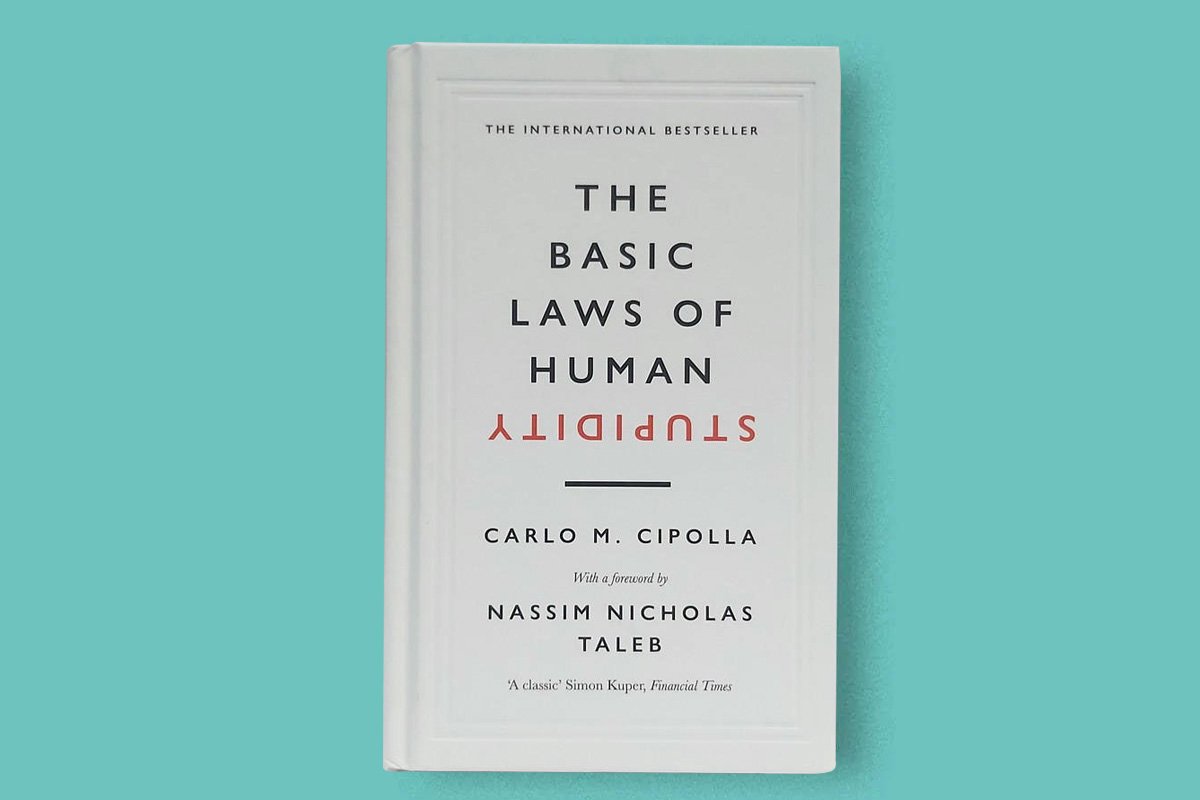Carlo M. Cipolla’s The Basic Laws of Human Stupidity is a remarkable satirical essay that delves into the enigmatic and often frustrating human behavior. At its core, the book reveals the hidden and pervasive force that stupidity plays in shaping the world. With humor and intellectual rigor, Cipolla offers a deeply thought-provoking analysis of the devastating impact of human stupidity on both individuals and society. His insights, while delivered humorously, expose some of the fundamental truths about irrational behavior. Below, we examine the key highlights of the essay, focusing on Cipolla’s key observations and their broader implications.
The First Basic Law: Underestimating Stupidity’s Prevalence
Cipolla’s First Basic Law of Human Stupidity asserts, “Always and inevitably everyone underestimates the number of stupid individuals in circulation.” This law is as blunt as it is unsettling. The idea that we consistently miscalculate the number of stupid people around us challenges our perception of society. According to Cipolla, cultural trends in the West often endorse an egalitarian view of humanity, where we assume that people are rational beings, shaped by education and culture. Yet, Cipolla argues that stupidity is not bound by these factors; it transcends all social and cultural constructs.
This law pushes us to confront an uncomfortable reality: we are surrounded by more irrational behavior than we care to admit. The problem is not just individual incompetence, but a broader misunderstanding of how pervasive stupidity is within all human groups. This highlights one of Cipolla’s central themes—stupidity cannot be eradicated through education or social progress, as it is not a function of intellectual capacity or socioeconomic status.
The Second Basic Law: The Universality of Stupidity
Perhaps Cipolla’s most egalitarian statement is found in his Second Basic Law, which reads, “The probability that a certain person be stupid is independent of any other characteristic of that person.” In this, Cipolla argues that stupidity is an innate trait, unrelated to one’s background, intelligence, or education level. In essence, a stupid person is born stupid, an act of Providence, and no amount of grooming or experience can change that.
This view challenges the modern belief that humans are entirely products of their environments or that rational thought can be taught. Cipolla asserts that stupidity is a natural, random phenomenon. Some people, despite their best efforts or circumstances, are just stupid. This law emphasizes the randomness of stupidity and the importance of acknowledging it rather than dismissing it as something that can be easily fixed or controlled.
The Four Basic Categories of Human Beings
Cipolla goes further by introducing his infamous four categories of human beings: the helpless, the intelligent, the bandit, and the stupid. While the helpless person allows themselves to be exploited, and the intelligent person seeks mutual benefit, the stupid person stands alone in their destructive capacity. Cipolla defines stupidity as causing harm to others without benefiting oneself, even potentially incurring losses in the process.
This is the essence of stupidity: actions that are not merely self-destructive but harm others irrationally. It is the person who wastes our time, money, and energy for no clear reason, often acting in ways that baffle logic. Cipolla emphasizes that there is no rational explanation for why stupid people do what they do. The only answer, he claims, is that they are inherently stupid.
Consistency in Stupidity: A Dangerous Quality
A crucial point Cipolla makes is that, while most people may not act consistently, stupid people do. He argues that they display a “strong proclivity toward perfect consistency in all fields of human endeavors.” The key takeaway here is that, unlike the helpless or the bandit, who might fluctuate in their behaviors based on circumstances, the truly stupid person consistently acts in a manner that harms others without benefiting themselves.
This consistency makes stupidity uniquely dangerous. Stupid people are not just irrational; they are predictably irrational, and therefore their potential for harm is significant. They can cause minor inconveniences or large-scale disasters, depending on the position they hold in society.
The Power of Stupid People in Positions of Authority
The destructive potential of stupidity grows exponentially when stupid people hold positions of power. Cipolla observes that individuals in positions of authority—whether bureaucrats, generals, politicians, or heads of state—who also happen to be stupid can inflict far greater damage than others. This damage is enhanced by the fact that their stupidity is amplified by their influence and power.
Historically, systems such as class, caste, and religion have often promoted such individuals to positions of authority, perpetuating their ability to wreak havoc on society. Cipolla’s critique extends beyond individual stupidity to societal structures that allow and even encourage stupid individuals to ascend to power, often to the detriment of everyone else.
The Underestimation of Stupidity’s Damage
In The Fourth Basic Law, Cipolla warns, “Non-stupid people always underestimate the damaging power of stupid individuals.” This law highlights the ongoing mistake made by rational, non-stupid individuals: they constantly underestimate the danger posed by the irrational actions of stupid people. Non-stupid individuals fail to recognize that no matter how well-intentioned their plans may be, interacting with stupid individuals almost always ends in costly consequences.
Reasonable people struggle to anticipate or comprehend unreasonable behavior. As a result, they leave themselves vulnerable to the consequences of associating with stupidity. This law serves as a reminder that intelligence is not enough to safeguard against stupidity, and that the failure to recognize this fact can lead to personal and societal losses.
Stupidity’s Societal Impact: A Force of Decline
The cumulative effect of Cipolla’s laws is a recognition that stupidity has a far-reaching impact on society as a whole. When stupid people are in action, society loses. Unlike the bandit, who at least reaps a personal gain, stupid people harm others without benefiting themselves. As a result, their irrational actions impoverish society, either by wasting resources, thwarting progress, or causing general disorder.
Stupidity is not just a personal defect; it is a social force that weakens communities and undermines progress. Cipolla’s essay, while satirical in tone, serves as a stark warning: underestimate the power of stupidity at your peril.
Conclusion: Cipolla’s Insightful Satire
The Basic Laws of Human Stupidity is a masterfully crafted essay that, while humorous, touches on profound truths about human nature. Cipolla’s analysis of stupidity transcends the individual and highlights its damaging effects on society at large. By defining stupidity as the act of causing harm to others without personal gain, Cipolla sheds light on the irrational forces at play in human behavior. His laws challenge us to rethink our understanding of intelligence, social structure, and the dangers that lie in underestimating stupidity’s prevalence and power.
Read my kindle highlights Click Here








